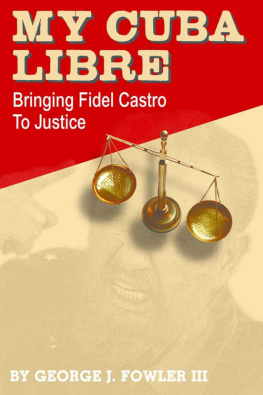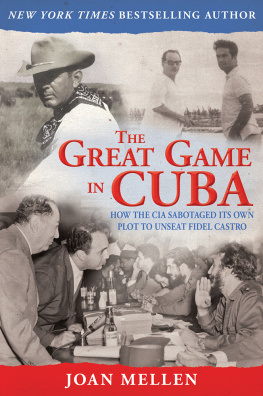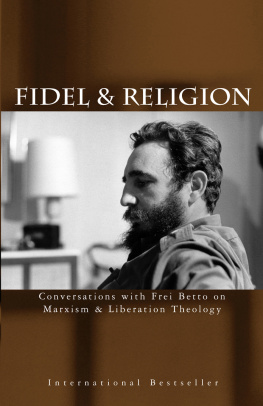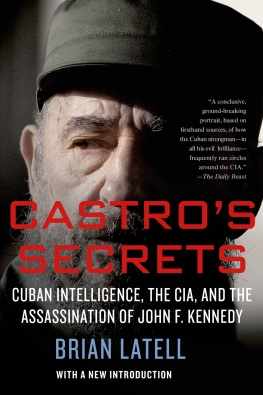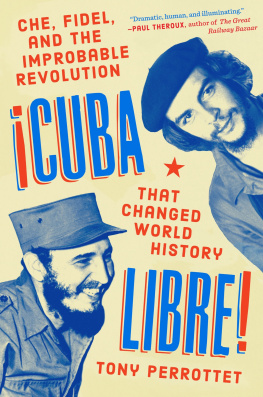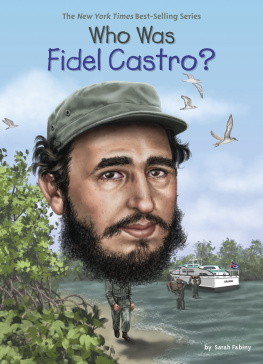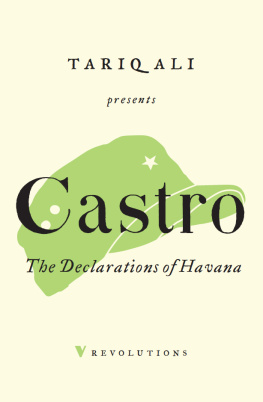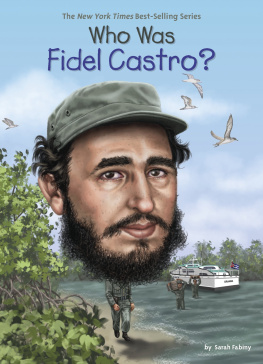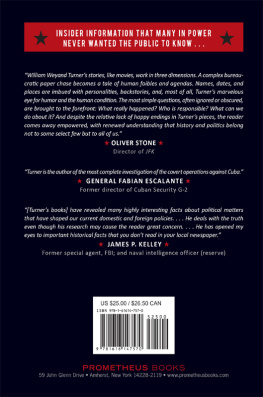
My older Sister, Great Grandmother, Grandmother and Mother in Villa Viejo
MY CUBA LIBRE
Bringing Fidel Castro to Justice
George J. Fowler, III

STORY MERCHANT BOOKS
BEVERLY HILLS
2013
Copyright 2013 by George J. Fowler, III. All rights reserved.
No part of this book may be reproduced or transmitted in any form or by any means, electronic or mechanical, including photocopying, recording, or by any information storage and retrieval system, without the express written permission of the author.
Find more on Facebook: If you dont like Fidel Castro, like this page
ISBN 10: 0989715426
ISBN 13: 9780989715423
Story Merchant Books
9601 Wilshire Boulevard #1202
Beverly Hills CA 90210
http://www.storymerchant.com/books.html
Cover and interior design by Robert Aulicino.
Cover photos: Castro: Getty Images, scale: istockphoto.com
T ABLE OF C ONTENTS
F idel is still alive.
The Cuban sun on my face would wake me. I would open my eyes, hear the birds, and smell the sweet fragrance of the mariposas . Id jump out of bed and dress up like Roy Rogers, who I thought was a Cuban. I also thought Mickey Mantle and Roger Maris of the New York Yankees were Cuban. They all spoke Spanish on Cuban TV. My Cuba was paradise. But one morning, sometime before dawn, I was awakened by the sound of gunshots. As my mother had taught me, I dropped to the floor. Our lives were about to change dramatically. It was January 1, 1959, and I was only nine years old.
Later in the day, I heard chanting and shouting but there was no cheering coming from my home. Fowler might not seem like a Cuban name, but our roots in Cuba go back to the nineteenth century; we are as Cuban as they come. My parents owned a modest, fairly modern house right on the edge of El Laguito, Havana, in the Country Club neighborhood. We lived in the shadow of my great-grandfathers home, Villa Viejo: a five-story mansion with gardeners and a staff of seventeen. That day, there was no cheering coming from Villa Viejo either.
Fidel Castro slowly worked his way toward Havana, making sure he had total control of the city before he moved in ten days later. His control soon extended over the whole island. Since then, he has worked to maintain his power above all else. Castro betrayed Cuba: destroying a nation, dividing a people, and causing untold suffering. My family was just one of thousands that the dictator uprooted and plundered.
This book is about the horrors of Castros Cuba and how his five decade old dictatorship savaged thousands of families, including my own.
Our lives in danger, we fled to the United States and settled in Fort Lauderdale, Florida. All of my familys assets were wiped out; two years later, my father chose to end his life. My mother moved us to San Juan, Puerto Rico, where I worked hard as a construction laborer. I moved to New Orleans to attend college, and the United States became my adopted homeland once more. Like many Cuban exiles, I survived and eventually thrived in America. Intelligent, enterprising, and capitalists at heart, Cubans are one of the most successful immigrant groups in the United States. If you want to see what the Cubans can do in a free economy, visit Miami.
Cuban Americans like me are proud defenders of this, the greatest nation on earth. I thank God for this country and its generous people and delight that my children and grandchildren have the privilege to call themselves Americans.
While Cuban exiles came to prosper in America, those who stayed behind faced poverty, despair, and a brutal authoritarian regime. Castro filled his prisons with anyone who dared to oppose or question him, and countless brave Cubans were unjustly tortured or killed. Government neglect and mismanagement led to widespread hunger and disease, and those who tried to escape were murdered or jailed. The U.S. made only one half-hearted attempt to dethrone Castro: the disastrous Bay of Pigs invasion in 1961. President Kennedy abandoned the courageous Cuban volunteer fighters of Brigade 2506 and left them to face Castros army alone. Since then, the international community has made no serious attempt to free Cuba, and the people continue to suffer.
After I graduated from LSU, I studied at Tulane Law School and entered the field of maritime law and worked under some of the best lawyers in the world. Eventually, I became successful enough to start my own firm. But as much as I grew to love America, I could never forget my homeland. I heard many horrible stories of the regimes cruelty, excess, and neglect. Like many other exiles, I dreamed of ways to remove Castro from power and bring freedom to my people. But rather than resort to violence, I struggled through legal means to bring him to account for his crimes. I am a lawyer to the bone and trust in the rule of law.
In the early 1990s, I had the good fortune of meeting a truly remarkable man: Jorge Mas Canosa, the founder of the Cuban American National Foundation (the Foundation). The Foundations mission is to bring democracy to Cuba through nonviolent means while advocating for Cuban exiles in the U.S. and abroad. Mas Canosa asked if I could provide the Foundation with legal advice, and soon I agreed to serve pro bono as General Counsel. Since then, I have made numerous legal efforts on the behalf of the Cuban people, many of which I will describe in this book. We battled to keep Elin Gonzlez in the United States; lobbied for Cuban interests in Washington, D.C.; and fought legal skirmishes with slanderers and publications like The New York Times .
Most importantly, we worked incessantly to bring Fidel Castro to trial for his crimes against humanity. I will describe many of his crimes in this book. While Fidel has evaded indictment so far, we will not stop until he faces justice. We prepared a massive criminal complaint in Spain its called a Querella for the Audiencia Nacional , the notorious Spanish international court. We gathered testimony and affidavits from hundreds of Cubans whose family members were tortured or killed by Castro terrible stories that needed to be told. We also battled to have Castro indicted in the United States after his fighter planes shot down two defenseless aircraft, killing all aboard, in the Brothers to the Rescue shoot-down. The lawsuits brought much-needed attention to our cause and kept Castro on his toes. But thats all it did. Castro has not been brought to justice. He must be indicted.
Whenever our efforts seemed to garner interest, Castros agents would send me little messages to let me know that they were paying attention. Id get anonymous threatening phone calls or mysterious postcards in the mail. One postcard had a New Orleans stamp to let me know that they were watching me in my own city. The postcard said, Jorgito, why dont you come visit us in Cuba ? It was signed, Fidel. I gave it to the FBI.
In 1999, I went before the U.S. Congress to present a case for Castros criminal indictment for murder. Two weeks later, I learned that Castro had talked about me in a public speech and had ranted on for hours. I was glad to hear that he had mentioned me; it meant that our efforts had gotten to him. A defector from his security team once told me that Castro was deeply afraid of being indicted and extradited like Chiles General Pinochet. Castro had given the defector instructions to prevent his arrest by any means, including preventative murder.
In that speech, Castro attacked the Cuban American National Foundation leadership, including Jorge Mas Canosa and his son, Jorge Mas Santos. Castro went on to condemn Roberto Martin Perez, a former Foundation Director who was imprisoned and tortured in Cuba for twenty-seven years. Castro also defamed Francisco Pepe Jos Hernndez, co-founder and president of the Foundation. Pepe is a staunch ally, and Im proud of all the work we do together against the dictator. The Foundation has associated me with true Cuban patriots and after thirty years of working together good friends.
Next page
